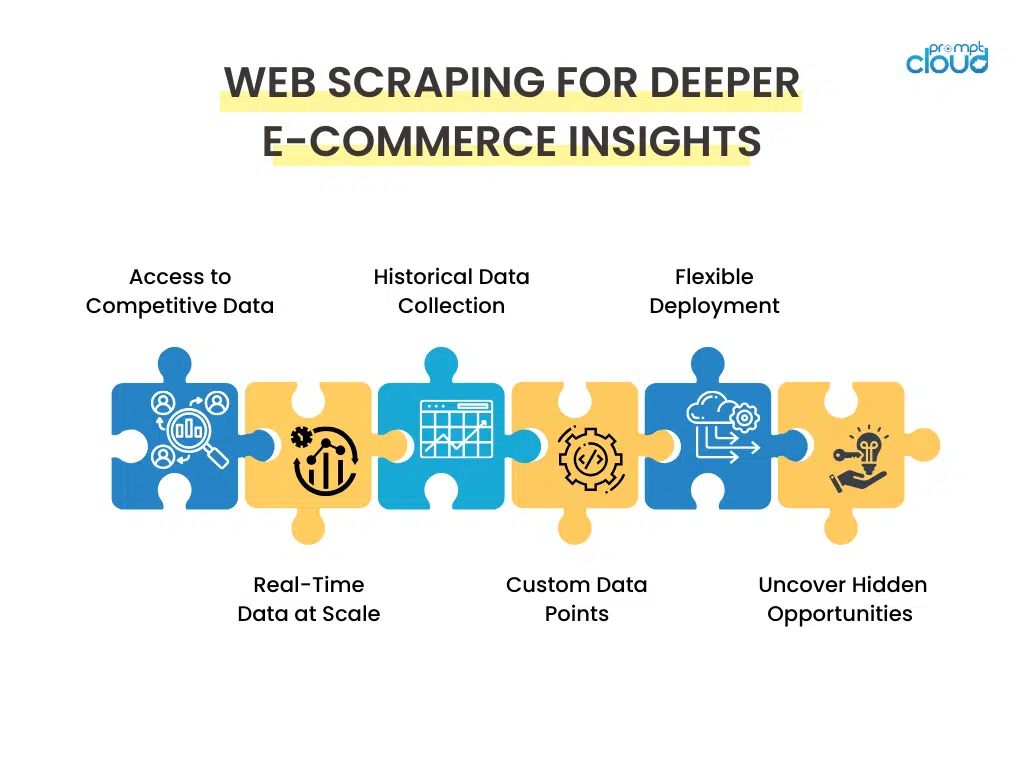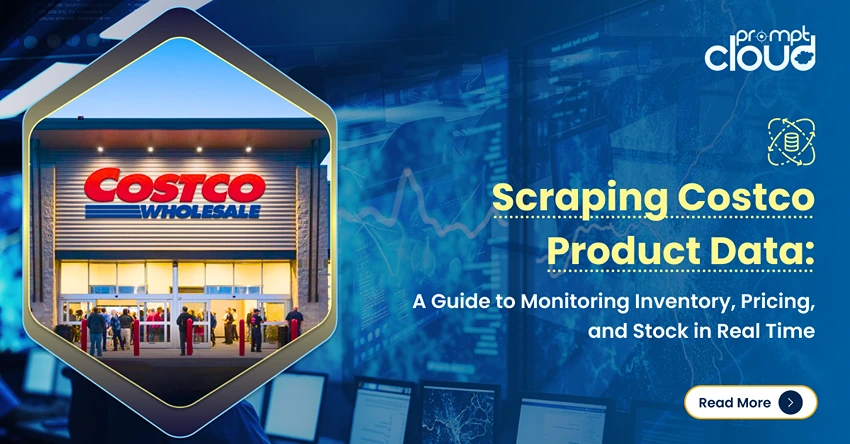
eBay has long been a critical marketplace for businesses looking to reach a wide audience. With its dynamic platform and robust ecosystem, sellers have access to a variety of tools designed to help them thrive. One of these tools is the eBay API, a powerful resource that allows developers to automate tasks, pull inventory data, and manage listings. However, while the eBay API offers useful insights, it has certain limitations that restrict businesses from accessing a broader, more in-depth data landscape.
Enter web scraping, a more versatile and comprehensive method that enables e-commerce businesses to gather rich, actionable insights, particularly for competitive analysis and product strategy. In this article, we’ll explore how web scraping augments the limitations of the eBay API, and why it should be a vital component of your e-commerce strategy.
What is the eBay API?
The eBay API is a set of web services that allows developers to interact with eBay’s system programmatically. It provides endpoints for various operations, such as managing listings, processing transactions, and monitoring sales. Through these APIs, sellers can efficiently manage their online stores without manually accessing the eBay platform.
The most widely used part of eBay’s API is the eBay Inventory API, which allows businesses to update and manage their inventory in real-time. This can be a huge advantage for sellers who need to automate inventory management across multiple eBay accounts or platforms.
What Are the Limitations of eBay’s API?
While the eBay API is undoubtedly useful, it comes with certain restrictions that limit its value, particularly when businesses need deeper competitive insights. Here are some of the common limitations of the eBay API:

1. Data Access Limitations
The eBay API offers a standardized set of data points, focusing primarily on inventory management, sales, and transactions. While these data points are crucial for sellers, they only scratch the surface when it comes to competitive intelligence. Sellers cannot retrieve certain types of data that are essential for comprehensive competitor analysis, such as competitors’ product descriptions, real-time pricing trends, or customer reviews.
2. Rate Limits
Another common limitation of the eBay API is rate limiting. The API imposes restrictions on how many requests can be made per day or per minute. For businesses that need large amounts of data for analysis, these limits can significantly slow down the process. Rate limiting can be particularly problematic for businesses that are running detailed product comparison analyses or competitive monitoring.
3. API Key Access
To use the eBay API, you need an eBay API key. While obtaining this key is straightforward, it still requires approval from eBay. The approval process may pose an obstacle, particularly for smaller sellers or new businesses. Additionally, if your usage exceeds eBay’s guidelines, your key can be revoked, disrupting your entire operation.
4. Limited Historical Data
The eBay API typically focuses on real-time transactions and current inventory. It does not offer comprehensive historical data that could be useful for tracking trends over time. Sellers who want to analyze how certain product prices or sales volumes have changed over months or years would find this limitation a significant hurdle.
5. Lack of Deep Customization
The eBay API operates under pre-set conditions that determine what data can be pulled and how it’s formatted. Sellers looking for niche, customized insights—such as how a particular keyword affects product rankings or how customer sentiment has shifted—will find themselves hitting roadblocks with the API alone.
Given these limitations, businesses seeking comprehensive e-commerce insights need a more flexible, scalable solution: web scraping.
How Web Scraping Unlocks Deeper E-Commerce Insights?
While the eBay API has its place in managing eBay stores and automating processes, web scraping offers the ability to extract more extensive, customizable data. Here’s how web scraping complements and surpasses the eBay API:

1. Access to Competitive Data
Web scraping allows you to gather not only your own product data but also your competitors’ information. By scraping competitor listings, you can track their product descriptions, pricing changes, stock levels, and customer reviews. This data can offer valuable insights into how competitors position their products, what pricing strategies they use, and how customers respond to their offerings.
For instance, with eBay API Python libraries, businesses can build custom scrapers that automatically pull data from multiple competitors’ listings at scale. This information can be analyzed for product development, pricing strategies, and marketing efforts.
2. Real-Time Data at Scale
While the eBay API imposes rate limits, web scraping offers a scalable solution for pulling vast amounts of data in real-time. By utilizing a well-configured scraper, businesses can bypass the limitations of API rate limits and retrieve large datasets efficiently. This is particularly beneficial for businesses that need to conduct daily or even hourly price tracking to stay competitive.
3. Historical Data Collection
Web scraping can also be used to collect and store historical data over time. This capability allows businesses to perform in-depth trend analyses, which the eBay API alone cannot provide. For instance, scraping data on how prices for certain products have fluctuated over the last year can help e-commerce businesses anticipate future pricing strategies or identify market trends that could affect sales.
4. Custom Data Points
Unlike the eBay API, which restricts you to predefined data fields, web scraping allows businesses to customize the data they want to extract. Need data on a specific keyword that appears in product descriptions? Want to know how frequently certain items appear in the “Best Sellers” category? Web scraping enables you to extract precisely the data points that are most relevant to your strategy, offering deep insights that are otherwise difficult to obtain through the API.
5. Flexible Deployment
Another key advantage of web scraping is its flexibility. Web scraping tools can be developed using a variety of programming languages, with eBay API Python being one of the most popular options. Python’s libraries like BeautifulSoup and Scrapy allow businesses to easily develop scrapers for complex data extraction tasks. These scrapers can be tailored to specific needs, such as tracking certain categories or focusing on particular product features.
6. Uncover Hidden Opportunities
By scraping product data beyond the reach of the eBay API, businesses can uncover hidden opportunities. For example, scraping customer reviews can reveal unmet customer needs or product shortcomings that are not immediately visible through standard sales data. Likewise, tracking competitors’ keyword usage in product titles and descriptions can reveal new SEO strategies to improve product visibility.
Combining Power of API & Web Scraping Together
For e-commerce businesses looking to maximize their data collection efforts, combining the strengths of both the eBay API and web scraping provides the best of both worlds. Use the eBay Inventory API for managing real-time stock levels and automating listing updates, while relying on web scraping for competitive analysis and long-term strategic insights.
With the eBay API, you can streamline day-to-day operations, while web scraping empowers you to think big—extracting competitor data, monitoring pricing trends, and customizing data collection to suit your unique business needs.
Conclusion
While the eBay API is a powerful tool for managing inventory and automating processes, it falls short when it comes to providing comprehensive, competitive insights. By integrating web scraping into your e-commerce strategy, you unlock the ability to gather deeper, more actionable data that goes beyond the API’s limitations.
Whether it’s gathering competitor intelligence, analyzing pricing trends, or customizing your data extraction to fit your needs, web scraping offers unparalleled flexibility and scalability. For e-commerce businesses serious about gaining an edge in the competitive marketplace, combining the eBay API with the power of web scraping is the key to success.By leveraging both solutions, you can stay ahead of the competition and ensure that your e-commerce strategy is driven by data that truly makes a difference. Schedule a demo with PromptCloud today and see how our powerful web scraping solutions can take your business to the next level!



















